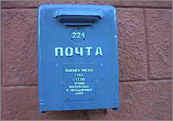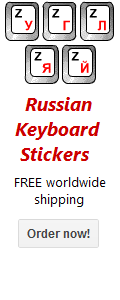 FR FR |
About us | Home | User agreement | Link to us |
The Instrumental Case
The instrumental case is used in the sentences like "Я пользуюсь... машиной, домом, водой" (I make use of ... a car, house, water). The nouns in the instrumental answer such questions as Кем? Чем?.
| Я восхищаюсь чем? | Я восхищаюсь его талантом. | - | (literally) By what am I admired? |
I admire his talent. |
| Катя работает кем? | Катя работает врачом. | - | (literally) As who does Katya work? |
Katya works as a doctor. |
The instrumental case is called so because it is used to describe the instrument by which and action is performed. For example: забивать гвоздь молотком (to drive in a nail with a hammer), писать ручкой (to write with a pen), ехать автобусом (to go by bus).
Using the Instrumental Case
The instrumental case is widely used to describe one's job - Я работаю учителем (I work as a teacher), Отец был рабочим (The father was a worker).
It is also used in space and time phrases. For example: ехать полем (to go through the field), проснуться утром (to wake up in the morning), вернуться летом (to come back in summer).
The instrumental case is used after such prepositions as за (behind), между (between), над (over), перед (in front of), под (under), c (with). For example:
| за домом | behind the house | |
| над столом | over the table | |
| перед рекой | in front of the river | |
| под водой | under water | |
| с учителем | with the teacher |
The instrumental can also be used without prepositions.
Instrumental Case Endings
The instrumental is formed from the nominative singular nouns with the help of the following endings: -ом, -ем, -ой, -ей, -ью (singular); -ами, -ями (plural).
The tables below sum up how the instrumental of nouns is formed.
The instrumental of singular nouns
| Nominative singular | Remove | Add | Instrumental | |
| masculine |
брат чай папа |
-- й а |
ом ем ой |
братом чаем папой |
| neuter | окно море |
о е |
ом ем |
окном морем |
| feminine | ночь вода |
ь а |
ью ой |
ночью водой |
Explanation of the table:
Add -ом to masculine nouns ending in a consonant (брат) and neuter nouns ending in -o (окно).
Add -ем to masculine nouns ending in -й, -ь (чай, учитель) and neuter nouns ending in -е (море, орудие).
Add -ей to feminine and masculine nouns ending in -я (тётя, дядя).
Add -ой to feminine and masculine nouns ending in -a (вода, папа).
Add -ью to feminine nouns ending in -ь (ночь).
The instrumental of plural nouns
| Nominative singular | Remove | Add | Instrumental plural | |
| masculine | мост гость край учитель |
-- ь й ь |
ами ями ями ями |
мостами гостями краями учителями |
| neuter | окно море |
о е |
ами ями |
окнами морями |
| feminine | коса стая |
а я |
ами ями |
косами стаями |
Explanation of the table:
Add -ами to masculine nouns ending in a consonant, neuter nouns ending in -o and -e and feminine nouns ending in -a.
Add -ями to masculine nouns ending in a -ь, neuter nouns ending in -e and feminine nouns ending in -я, -ь.
Got questions?
Ask them in the Russian Questions and Answers — a place for students, teachers and native Russian speakers to discuss Russian grammar, vocabulary, pronunciation, and other aspects of the Russian language.
Copyright 2001-2026 MasterRussian.com | Privacy Policy | Contact Us
 Russian Lessons
Russian Lessons
- Russian alphabet
- Names of letters
- Russian Q&A new
- Pronunciation: Cons.
- Pronunciation: Vowels
- Noun Gender/Number
- Cases of Nouns
- Russian Greetings
- Personal Pronouns
- Learning Russian
- 1000 Common Words
- 500 Russian Verbs
- Top Russian Nouns
- » All lessons
- » Guest lessons
 Browse Topics
Browse Topics
- Start learning Russian
- Forum
- Bookstore
- Dictionaries
- Russian - basic
- Russian - adv
- Pronunciation
- Russian Blog new
- Reading
- Test & quizzes
- Translation
- Verbs
- Verb Conjugations
- Russian numbers
- Russian Tests new
- Vocabulary
- Writing
- Folk music
- Fun stuff
- Leo Tolstoy
- Learner's lore
- Literature
- Personal blogs
- Picture Dictionary new
- Proverbs
- Publications
- Radio & TV
- Russian culture
- Schools in Russia
- Russian Words
- Russian names
- Software
- Russian Words iPhone
Clicks the "Like" button below to get daily updates on Facebook!
Click "Add to circles" to learn Russian on Google+

Search MasterRussian

English » Russian dictionary

WORD OF THE DAY
![]() RSS
|
iGoogle
|
My Yahoo!
RSS
|
iGoogle
|
My Yahoo!
Meaning: the very, most, the same
Pronunciation: [SAH-miy]
Learn Russian words! »
TODAY'S STREET SIGN

Russian: Почта
English: Post office
FOLLOW US ON TWITTER

MasterRussian on Twitter


